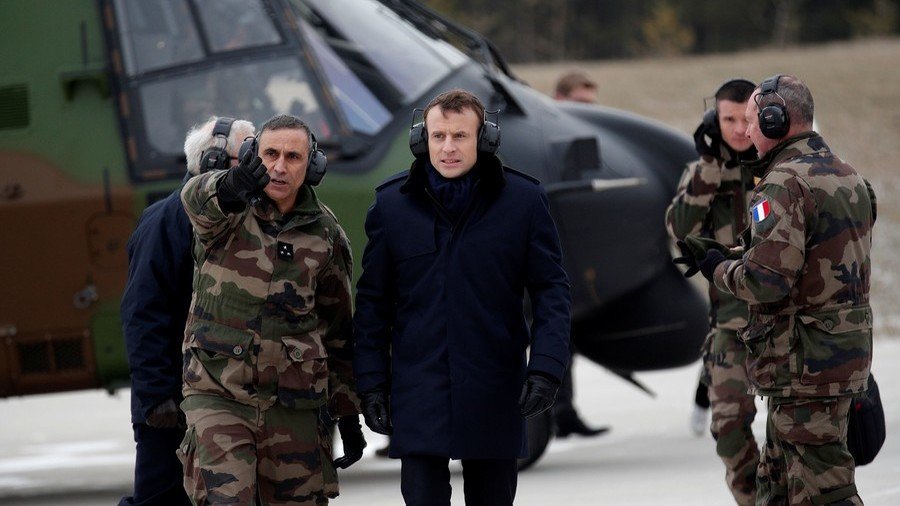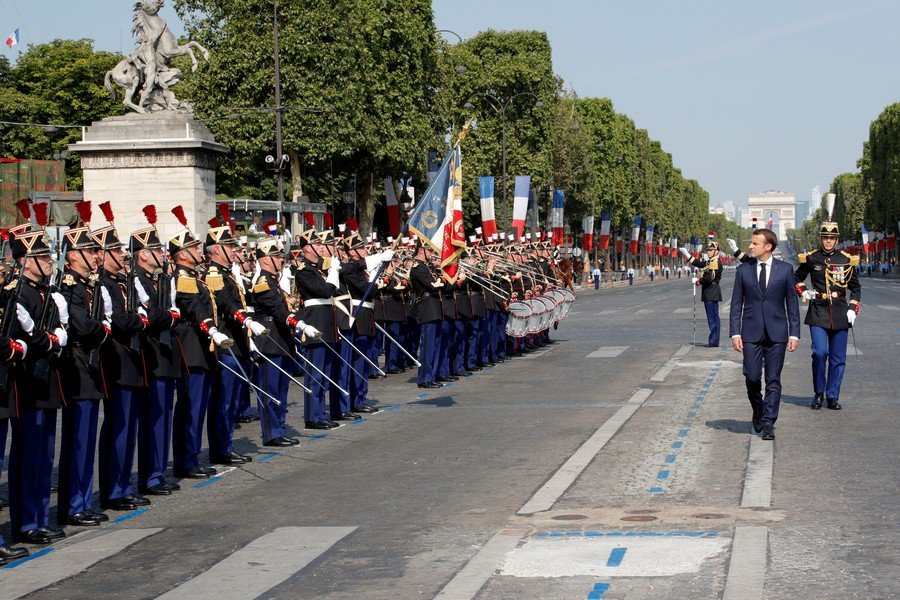Macron wants ‘real European army’ to combat Russian threat & end reliance on US

French President Emmanuel Macron is pushing for a “real European army” to better defend the continent against Russia. He also said Europe, which mainly depends on the US for security, won’t rely solely on its overseas ally.
In a lengthy interview to Europe 1 radio, the French president once again revived his ambitious plans for a combined EU military force. “We won’t protect Europeans if we don’t decide to have a real European army.”
Russia… is near our borders and has shown it could be threatening.
Macron wants the EU military to be independent from its key partner on the other side of the Atlantic. “We must have a Europe that can defend itself on its own without relying only on the United States,” he said, echoing earlier statements.
READ MORE: Le Pen’s Eurosceptic party beats Macron’s in EU parliamentary election poll
In the interview, Macron also criticized US President Donald Trump for deciding to withdraw from the decades-old Intermediate-Range Nuclear Forces Treaty (INF). “When I see President Trump announcing that he’s quitting a major disarmament treaty which was formed after the 1980s euro-missile crisis that hit Europe, who is the main victim? Europe and its security.”
For Macron, Trump’s actions would have consequences for Europe.
“We have to protect ourselves with respect to China, Russia and even the US,” he said.
The French president was one of the first leaders who openly admitted that Trump’s decision to withdraw from the historic agreement was harmful to European security. Trump’s move has been met with waves of criticism in Germany, with the country’s foreign minister saying that Europe needs to re-think arms control and disarmament strategies to preserve peace.
Macron rhetoric aimed at election boost, not actual army
The idea of a joint European armed force has been floating around since the 1950s, but was never allowed happen for real due to political and economic reasons, Evgeny Osipov from the Institute of World History in Moscow told RT.
The current resurgence of the idea has been fueled by the rhetoric of US President Donald Trump and may get a boost from Brexit, since without Britain as part of the EU, France and Germany will have more leeway in promoting it. But economy always was and remains the biggest obstacle here.

“Creating joint European armed forces and a truly united European defense is an expensive project. At the moment there is no money for it in the European budget and it’s not clear where this money is expected to come from,” he said. “The European economy remains unstable. There are factors making it less stable, like the situation in Italy… Some European nations are simply not used to spending money on defense.”
Sergey Fedorov, an expert on French affairs, from Moscow’s Institute of Europe agreed, pointing out that even without Britain the US-dominated NATO will have its advocates in the EU, including Poland and the three Baltic states. He added that even countries less known as conduits of American interests in Europe prefer buying US-made weapons rather than invest in competing European projects. For example, Belgium and the Netherlands both recently sealed deals for American fighter jets.
NATO is 70 percent American and without the US NATO will not exist, frankly speaking. So the French idea to ‘europeize NATO’ is yet to show its viability, and whether or not the US allows it is debatable too.
Macron’s rhetoric has less to do with actually changing the way Europe defends itself and more to do with the upcoming European Parliament elections next year, Osipov believes. The election is expected to strengthen the positions of populist and right-wing forces, which will be contrary to Macron’s integration agenda.
He is trying to play for votes in the May 2019 election, strengthen the position of pro-European parties in the European Parliament.
Think your friends would be interested? Share this story!














